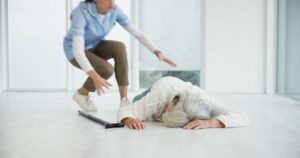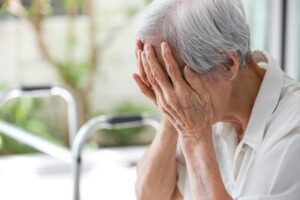Common Causes of Nursing Home Falls
Abuse and Neglect, Nursing Home AbuseNursing home falls often lead to severe injuries and even fatalities among residents. Each fall represents a potential case of neglect or abuse, underscoring the urgent need for legal intervention. Victims and their families face emotional and financial burdens, making it crucial to hire a nursing home abuse lawyer to secure compensation and ensure accountability.
The following is a look at some of the common causes of nursing home falls and why legal assistance is critical to obtaining justice for affected residents.
Negligent Staffing and Training
There are typically about 1.6 million residents in nursing homes nationwide. Research shows that about 50 percent of them will fall at least once a year. Nearly 30 percent of them fall at least twice yearly.
Proper staffing and comprehensive training are crucial in preventing falls in nursing homes. When staffing levels are inadequate or staff members are poorly trained, the risk of falls and related injuries significantly increases.
How Negligent Staffing and Training Contribute to Falls

Understaffing in nursing homes often means there aren’t enough caregivers to monitor and assist residents adequately. This shortage is one of the most common causes of nursing home falls. It can lead to delays in responding to calls for help, insufficient supervision during activities, and a lack of mobility assistance, all of which are critical in preventing falls. Residents might attempt to move or perform tasks on their own, leading to an increased risk of falling.
Poorly trained staff worsen the problem. Inadequate training means caregivers may not know how to properly assist residents with mobility, use safety equipment correctly, or create a safe environment free of hazards. Without proper knowledge and skills, staff are less able to prevent falls and respond effectively when they occur.
Legal Responsibilities of Nursing Homes
Nursing homes have a legal obligation to ensure the safety and well-being of their residents. They must provide adequate staffing levels and ensure proper staff training. Federal and state regulations and standards require nursing homes to maintain a certain caregiver-to-resident ratio and provide ongoing staff training.
When a nursing home fails to meet these requirements, victims and their families can hold the facility liable for any resulting harm. Negligent staffing and training can be grounds for legal action, as these deficiencies directly impact the safety of residents and contribute to incidents such as falls.
Get Legal Help to Hold Nursing Homes Accountable
An experienced nursing home abuse lawyer can investigate the circumstances of the fall, gather evidence of staffing and training deficiencies, and hold the facility accountable for its negligence.

Legal action can secure compensation for your loved one’s injuries and prompt necessary changes in the nursing home to prevent future incidents. A skilled nursing home abuse lawyer will work to protect your loved one’s rights and help you take the first step toward justice.
Environmental Hazards
The physical environment of a nursing home plays a critical role in ensuring residents’ safety and well-being. Environmental hazards are also among the most common causes of nursing home falls. Ensuring a safe environment is a fundamental responsibility of nursing home management, directly impacting the quality of care provided to residents.
Common Hazards in Nursing Homes
Several environmental hazards can contribute to falls and injuries in nursing homes. Here are some of the most common:
- Slippery floors: Wet or polished floors can be extremely dangerous for residents, especially those with mobility issues. Failing to clean up spills promptly and inadequate use of non-slip mats increase the risk of falls.
- Poor lighting: Insufficient lighting, particularly in hallways and stairwells, can lead to trips and falls. Proper illumination is essential for residents to navigate safely.
- Cluttered hallways: Hallways and walkways cluttered with equipment, furniture, or personal items can obstruct pathways and create tripping hazards. Clear and unobstructed pathways are crucial for safe movement.
- Unsafe flooring: Uneven surfaces, torn carpets, and loose tiles are other common causes of nursing home falls. Regular maintenance and prompt repairs are necessary to ensure safe flooring conditions.
- Inadequate handrails: The absence of handrails in key areas like staircases and bathrooms can leave residents without the necessary support, increasing fall risk.
Legal Standards for a Safe Environment
Nursing homes must maintain a safe environment for their residents. Federal and state regulations mandate that nursing homes must take reasonable steps to prevent environmental hazards. It includes regular inspections, prompt repairs, and adherence to safety protocols. Failure to comply with these standards can result in citations, fines, and legal liability for any harm caused to residents.
How a Lawyer Handles Environmental Hazards Claims in a Nursing Home
When a resident suffers a fall or injury due to environmental hazards, seeking legal assistance is essential. A skilled nursing home abuse lawyer can help in the following ways:
- Investigating: Conducting a thorough investigation to identify the hazardous conditions and gather evidence.
- Documenting: Collecting witness statements, medical records, and maintenance logs to build a strong case.
- Negotiating: Engaging with the nursing home’s insurance and legal representatives to seek fair compensation.
- Litigating: If necessary, taking the case to court to ensure the resident receives the compensation they deserve.
Medication Errors

Medication management is a critical aspect of care in nursing homes, significantly impacting residents’ health and safety. Proper medication administration ensures that residents receive the correct dosages at the right times, avoiding adverse reactions and complications.
However, when staff members mishandle medication management, it can lead to severe consequences, including an increased risk of falls. Falls related to medication errors can cause severe injuries and diminish the quality of life for nursing home residents.
Common Medication Errors
Several common medication errors in nursing homes can lead to falls. These include:
- Incorrect dosages: Administering too much or too little medication can have dangerous effects. Overdosing can cause dizziness, weakness, or sedation, leading to falls, while under dosing can result in insufficient management of health conditions, making falls more likely.
- Harmful drug interactions: Many residents take multiple medications for various health issues. If these medications interact negatively, they can cause side effects such as confusion or impaired motor skills, which are among the most common causes of nursing home falls.
- Missed doses: Failing to administer medications on schedule can lead to health complications that increase fall risk. For example, not providing a resident with their blood pressure medication can result in a sudden drop or spike in blood pressure.
The Legal Ramifications of Medication Errors
Nursing homes must have protocols for proper medication administration, including regular staff training, accurate record-keeping, and prompt responses to medication errors. When nursing homes fail to meet these standards, a nursing home lawyer can hold them responsible for any resulting harm to residents.
How an Attorney Can Help
If a loved one has suffered a fall due to medication errors in a nursing home, seeking legal help is essential. An experienced nursing home abuse lawyer can:
- Investigate the case: Examine medical records, staff reports, and facility protocols to identify the medication errors and their causes.
- Gather evidence: Collect evidence such as witness testimonies and expert opinions to build a strong case.
- Negotiate compensation: Work with insurance companies and the nursing home to secure fair compensation for medical expenses, pain and suffering, and other related costs.
Improper Use of Restraints

The improper use of physical restraints in nursing homes is a serious issue that can lead to falls and significant injuries among residents. Restraints, when used incorrectly, can cause physical harm, emotional distress, and decreased mobility, ultimately increasing the risk of falls. Properly managing the use of restraints is crucial for ensuring the safety and well-being of nursing home residents.
Common Issues with Restraint Use
Several common issues arise from the misuse or overuse of physical restraints in nursing homes:
- Unnecessary restraint use: In some cases, residents may be restrained without medical necessity, leading to physical deconditioning and a higher likelihood of falls when they attempt to move independently.
- Improper application: Restraints applied incorrectly can cause injuries, such as bruises, cuts, or even broken bones, and may lead to falls if residents struggle to free themselves.
- Lack of monitoring: Restrained residents need regular monitoring to ensure safety and well-being. Restrained residents may attempt to escape without adequate supervision, resulting in falls and injuries.
Regulatory Compliance
Physical restraints in nursing homes are strictly regulated to protect residents’ rights and ensure their safety. Facilities must only use restraints as a last resort, under a physician’s order, and when necessary to treat a resident’s medical symptoms.
Nursing homes must follow specific guidelines for applying, monitoring, and documenting restraints. They must always seek alternative methods before resorting to physical restraints and continually assess the resident’s need for restraint use.
Why You Need an Attorney for a Fall Due to Improper Restraint Use
If your loved one has suffered an injury due to the improper use of restraints in a nursing home, seeking legal assistance is crucial. An experienced nursing home abuse lawyer can:
- Investigate the case: Conduct a thorough investigation to determine if staff members misused or overused restraints and gather evidence to support the claim.
- Document violations: Collect medical records, witness statements, and expert testimonies to establish regulatory violations and negligence.
- Pursue compensation: Advocate for fair compensation for medical expenses, pain and suffering, and other related damages.
- Ensure accountability: Hold the nursing home accountable for improper restraint use, prompting changes to prevent future incidents.
Resident Neglect

Resident neglect in nursing homes is a serious issue that significantly increases the risk of falls and other injuries. Neglect occurs when caregivers fail to provide residents with the necessary care and attention to maintain their health and safety. This lack of proper care can lead to physical, emotional, and psychological harm, making residents more susceptible to accidents and falls.
Examples of Neglect
Neglect in nursing homes can take many forms, all of which contribute to an increased risk of falls:
- Ignoring call lights: When residents call for assistance, and staff members ignore their requests or fail to respond promptly, they may attempt to move on their own, leading to falls. Prompt response to call lights is essential for ensuring residents receive the help they need.
- Failure to assist with mobility: Many residents require help with walking, transferring from beds to chairs, or using mobility aids. When staff fail to provide this assistance, residents may try to manage these tasks alone, increasing their risk of falling.
- Inadequate supervision: Continuous monitoring is crucial for residents who are at high risk of falls. Lack of supervision can lead to residents wandering or attempting activities beyond their physical capabilities.
Proving Neglect
Proving resident neglect in a nursing home can be challenging but is essential for securing justice and compensation for the victims. The legal consequences of neglect can be severe, including fines, penalties, and lawsuits. A nursing home lawyer will typically take the following steps to establish a case of neglect:
- Documentation: Gather detailed records of the neglect, including medical reports, photographs of injuries, and documentation of the nursing home’s conditions.
- Witness statements: Collect testimonies from other residents, family members, and staff who can provide evidence of neglectful behavior.
- Expert opinions: Call upon healthcare experts to review the case and provide professional opinions on the standard of care and how neglect led to the resident’s injuries.
- Legal representation: Hiring an experienced nursing home abuse lawyer is crucial. They can handle all legal complexities, gather necessary evidence, and build a strong case to help victims obtain maximum compensation.
A Skilled Nursing Home Abuse Attorney is Ready to Help
If your loved one has suffered a severe injury due to one of the common causes of nursing home falls, it’s crucial to act immediately. Nursing home falls can be a sign of neglect or abuse, and the consequences can be devastating. An experienced personal injury lawyer will be dedicated to holding facilities accountable and securing the compensation your family deserves.
Don’t let your loved one become another statistic. Contact a local law firm today for a free consultation. The right attorney will fight tirelessly to achieve justice and protect your loved one’s rights. Please get in touch as soon as possible to take the first step toward safeguarding their well-being.
Nathan Hughey, an attorney and fourth-generation South Carolinian, founded Hughey Law Firm in 2007. Before that, he spent five years defending nursing homes and insurance companies. Leveraging his experience, he now advocates for those injured or wronged by such entities, securing over $220 million in verdicts and settlements.
